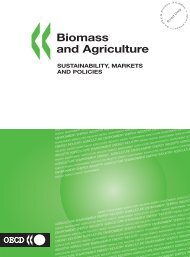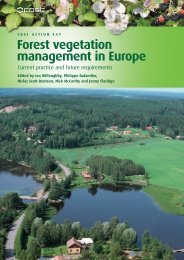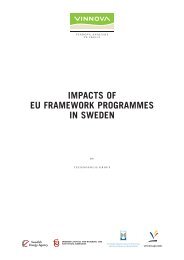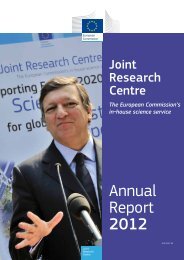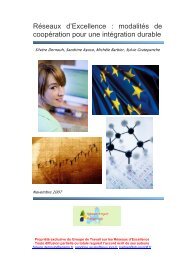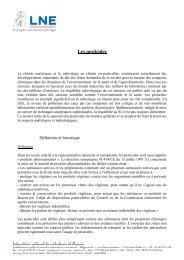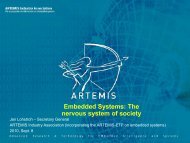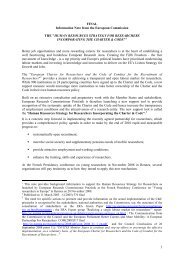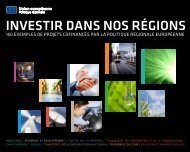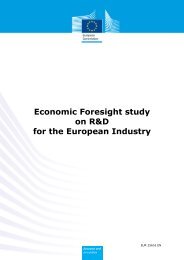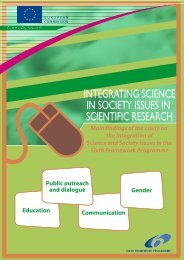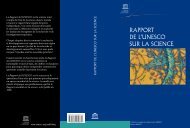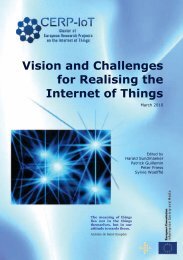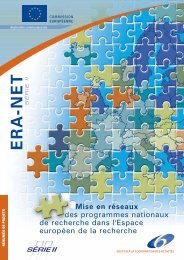FR - Eurosfaire
FR - Eurosfaire
FR - Eurosfaire
You also want an ePaper? Increase the reach of your titles
YUMPU automatically turns print PDFs into web optimized ePapers that Google loves.
According to Article 7(4) of the Regulation, imports of this alcohol from all GSP beneficiary<br />
countries qualified for a 15% reduction on the MFN duty 19 .<br />
Under the special drugs regime established by Council Regulation (EC) No 2501/2001, which<br />
was in force from the early nineties until repealed on 30 June 2005, exports from a number of<br />
countries (Bolivia, Colombia, Costa Rica, Ecuador, Guatemala, Honduras, Nicaragua,<br />
Panama, Peru, Pakistan, El Salvador and Venezuela) qualified for duty-free access under<br />
code 2207.<br />
The new GSP Regulation (Council Regulation (EC) No 980/2005 of 27 July 2005), which<br />
applies from 1 January 2006 to 31 December 2008, no longer provides for any tariff reduction<br />
for either denatured or undenatured alcohol under code 2207 (still classified as a sensitive<br />
product). This Regulation put in place a special incentive arrangement for sustainable<br />
development and good governance (the new GSP+ incentive scheme), which has been in force<br />
on a provisional basis since 1 July 2005 and applies on a permanent basis from 1 January 2006<br />
to 31 December 2008. This new incentive arrangement grants unlimited and duty-free access<br />
(suspension of Common Customs Tariff duties) to denatured or undenatured alcohol under<br />
code 2207. It includes all the countries that already benefited from the previous drugs scheme,<br />
with the exception of Pakistan, which is subject to the full MFN duty.<br />
The new incentive arrangement now also includes Georgia, Sri Lanka, Mongolia and<br />
Moldova, which have not so far exported bioethanol to the EU.<br />
Moreover, a special arrangement for the least developed countries (the EBA initiative) under<br />
the new GSP Regulation offers unlimited duty-free access to denatured or undenatured alcohol<br />
under code 2207.<br />
3.2. Cotonou Agreement<br />
Under the Cotonou Agreement, ACP countries qualify for duty-free access for denatured and<br />
undenatured alcohol under code 2207 with the sole exception of South Africa. Under<br />
Regulation (EC) 2501/2001, South Africa enjoys a 15% reduction in customs duties. From<br />
1 January 2006 it has to pay full MFN duty.<br />
3.3. Other countries with preferential arrangements<br />
Egypt currently has unlimited duty-free access to the EU under the Euro-Mediterranean<br />
Agreement. Before that, it qualified for a 15% reduction under the GSP scheme.<br />
Norway, which ranks among the top ten exporters with a total of 89 375 hl under code 2207 in<br />
2004, has been granted duty-free access to the EU under the system of tariff rate quotas<br />
(TRQs) since the mid-nineties. In 2005 the TRQ will total 164 000 hl for exports under code<br />
2207 10 (up from 134 000 hl the previous year) and 14 340 hl under code 2207 20, up from<br />
3 340 hl.<br />
4. Trade analysis – ethanol<br />
Table IV sums up trade under the various preferential arrangements.<br />
19 Article 7(4) of Council Regulation (EC) No 2501/2001 of 10.12.2001.<br />
<strong>FR</strong> 28 <strong>FR</strong>



